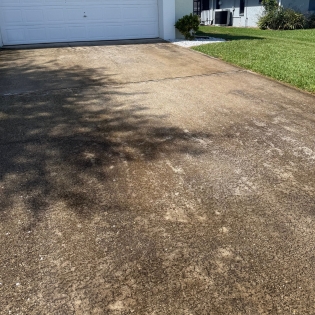How to Keep Your Driveway & Sidewalks Clean Year-Round
- AAA Pressure Washing

- Aug 25, 2025
- 3 min read
Updated: Feb 16
Your driveway and sidewalks are more than just functional spaces — they’re some of the first things people notice when they pull up to your home. But in Southwest Florida, it doesn’t take long for these surfaces to lose their fresh, clean look. Oil drips, tire marks, rust stains from irrigation, and the constant heat and humidity create the perfect environment for dirt, algae, and mildew. The result? Concrete and pavers that look aged, stained, and uninviting. That’s why so many homeowners trust AAA Pressure Washing for pressure washing Cape Coral services that restore curb appeal quickly and safely.
Why Do Driveways & Sidewalks Get Dirty So Quickly?
Florida’s Climate: Heat, humidity, and rain encourage algae and mildew growth.
Cars & Foot Traffic: Oil leaks, tire marks, and everyday use stain the surface.
Sprinkler Systems: Rust-colored streaks from irrigation are tough to remove.
Sun & Storms: Weathering dulls and discolors both concrete and pavers.
DIY Tips for Homeowners
Regular upkeep helps slow down staining and keeps your property looking neat. Here are a few safe, effective ways to maintain your driveway and sidewalks between professional cleanings:
Sweep or Blow-off with a Leaf Blower Weekly: Removing leaves, dirt, and debris prevents buildup that leads to stains.
Rinse with a Hose: A garden hose on a strong setting can wash away dust and pollen.
Treat Spills Quickly:
Oil & grease: Sprinkle baking soda or kitty litter to absorb before rinsing.
Rust: Lemon juice or vinegar may help lighten fresh stains.
Food & drink: Warm soapy water and a stiff brush work well.
Use Mild Soap for Spot Cleaning: Mix dish soap with warm water for scrubbing small areas. Avoid bleach or harsh chemicals — they can cause spotting and damage landscaping if unproperly diluted.
Be Careful with Pressure Washers: Home models are fine for rinsing, but:
Keep the nozzle 12 inches away to prevent etching.
Avoid blasting paver joints — you’ll wash out the sand.
Safety First: Wear non-slip shoes, be careful on wet surfaces, and avoid spraying near electrical outlets.
When DIY Isn’t Enough
Even with regular upkeep, some issues require professional treatment:
Algae & Mildew Growth – Creates slippery, unsafe walking areas.
Deep Oil or Rust Stains – DIY cleaners rarely reach below the surface.
Uneven Appearance – Streaks or blotches often remain after home pressure washing.
Recurring Growth – If algae or mildew return quickly, professional detergents are needed to kill the source.
How Paver Sealing Helps Keep Driveways & Sidewalks Clean Longer

For homeowners with paver driveways and sidewalks, professional cleaning is only part of the solution. While pressure washing removes algae, mildew, stains, and buildup, paver sealing helps protect those clean surfaces long-term. Sealing after cleaning locks in color, stabilizes the joints between pavers, and slows how quickly dirt, weeds, and organic growth return.
In Southwest Florida’s hot, humid climate, unsealed pavers can absorb moisture and stains quickly, making them look dirty again sooner than expected. Paver sealing in Cape Coral creates a protective barrier that helps shield pavers from UV fading, water intrusion, oil stains, and irrigation rust. For homeowners looking to reduce maintenance and keep driveways and sidewalks looking cleaner year-round, sealing is often the most effective next step after professional pressure washing.
The AAA Pressure Washing Difference
At AAA Pressure Washing, we use the right combination of professional-grade equipment, detergents, and expertise to restore driveways and sidewalks safely. Our surface cleaners ensure even, streak-free results, while our angled pressure techniques protect surrounding landscaping and paver joints.
We don’t just make your driveway look good for a week — our methods deliver a longer-lasting clean that protects your home’s curb appeal and prevents damage.
Ready to Refresh Your Curb Appeal?
DIY upkeep goes a long way, but nothing matches the deep, even results of a professional driveway and sidewalk cleaning. If your surfaces are looking weathered, stained, or slippery, AAA Pressure Washing is here to help.
Contact us today for reliable, professional pressure washing in Cape Coral, Fort Myers, and across Southwest Florida — because your home deserves to shine!







